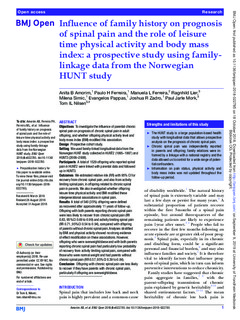Influence of family history on prognosis of spinal pain and the role of leisure time physical activity and body mass index: A prospective study using family-linkage data from the Norwegian HUNT study
Amorim, Anita B.; Ferreira, Paulo H.; Ferreira, Manuela L.; Lier, Ragnhild; Simic, Milena; Pappas, Evangelos; Zadro, Joshua R.; Mork, Paul Jarle; Nilsen, Tom Ivar Lund
Journal article, Peer reviewed
Published version

Åpne
Permanent lenke
http://hdl.handle.net/11250/2614352Utgivelsesdato
2018Metadata
Vis full innførselSamlinger
Sammendrag
Objectives To investigate the influence of parental chronic spinal pain on prognosis of chronic spinal pain in adult offspring, and whether offspring physical activity level and body mass index (BMI) modified this association.
Design Prospective cohort study.
Setting We used family-linked longitudinal data from the Norwegian HUNT study collected in HUNT2 (1995–1997) and HUNT3 (2006–2008).
Participants A total of 1529 offspring who reported spinal pain in HUNT2 were linked with parental data and followed up in HUNT3.
Outcomes We estimated relative risk (RR) with 95% CI for recovery from chronic spinal pain, and also from activity limiting spinal pain, in offspring related to chronic spinal pain in parents. We also investigated whether offspring leisure time physical activity and BMI modified these intergenerational associations in spinal pain.
Results A total of 540 (35%) offspring were defined as recovered after approximately 11 years of follow-up. Offspring with both parents reporting chronic spinal pain were less likely to recover from chronic spinal pain (RR 0.83, 95% CI 0.69 to 0.99) and activity limiting spinal pain (RR 0.71, 95% CI 0.54 to 0.94), compared with offspring of parents without chronic spinal pain. Analyses stratified by BMI and physical activity showed no strong evidence of effect modification on these associations. However, offspring who were overweight/obese and with both parents reporting chronic spinal pain had particularly low probability of recovery from activity limiting spinal pain, compared with those who were normal weight and had parents without chronic spinal pain (RR 0.57, 95% CI 0.39 to 0.84).
Conclusion Offspring with chronic spinal pain are less likely to recover if they have parents with chronic spinal pain, particularly if offspring are overweight/obese.
